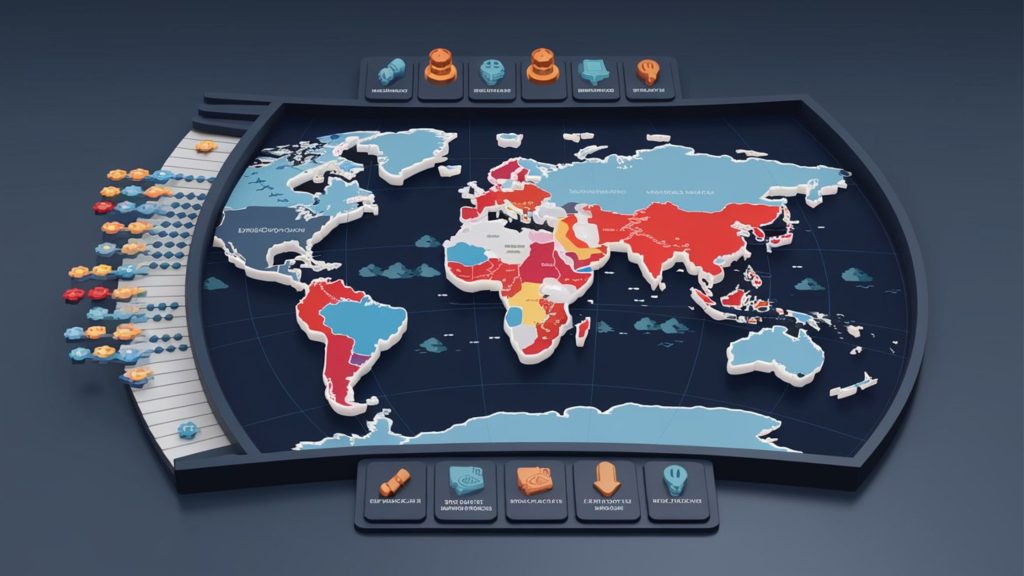
suzerain b

The allure of video games goes beyond mere entertainment. They offer an immersive experience, engaging the player in a way that books, movies, or television rarely achieve. One such game that delivers a compelling and thought-provoking experience is **Suzerain**, a political simulator developed by Torpor Games and released in December 2020. In this long-form review, we’ll delve into the game’s unique elements, exploring why it stands out among political simulators and how it brilliantly captures the intricate web of governance, diplomacy, and personal decisions.
The Premise: Leading a Fragile Nation
In **Suzerain**, you step into the shoes of Anton Rayne, the newly elected president of the fictional country **Sordland**. This is a nation ravaged by military coups and civil war, now teetering on the edge of collapse. Your mission as Rayne is to restore stability and reform, all while navigating the interests of powerful factions, competing ideologies, and the ever-looming threat of international conflicts.
Unlike traditional political simulation games, **Suzerain** isn’t about micromanaging individual troops or building cities. Instead, it focuses on the **decisions you make** as a leader, and how those choices reverberate through the government, your personal life, and the lives of the citizens of Sordland.
Gameplay Mechanics: A Blend of Strategy and Narrative
The gameplay is deceptively simple. You’re presented with a **map** of Sordland and text-based **pop-up decisions**. Unlike typical grand strategy games where you might have armies to command or resources to manage directly, here, the power lies in your ability to **negotiate**, **reform**, and **maneuver** politically.
The brilliance of **Suzerain** lies in its **writing**. Every choice you make—whether it’s about the economy, diplomacy, or even your family—feels deeply consequential. There are no easy decisions, and you will often find yourself in a moral or political dilemma.
The Weight of Your Choices
As you navigate the complex landscape of Sordish politics, you’ll quickly realize that every action has a **ripple effect**. For example, in one early sequence, you’re asked to decide whether your **parents** were wealthy, middle-class, or poor. This not only affects your personal wealth and ability to lobby for reforms but also impacts subtle dialogue choices later in the game. At a formal dinner, your background may influence whether Anton recognizes the vintage of wine or not. These small details create a richer, more immersive experience.
Balancing Ideals and Pragmatism
One of the central conflicts in **Suzerain** is balancing your desire for **reform** with the political realities of the world you inhabit. Sordland is divided between **wealthy oligarchs** who favor a larger private sector and **conservatives** who resist giving up control over state institutions. Any reform you attempt will likely upset one group or another, leading to potential political fallout.
For example, when dealing with the **Blud minority**, you can choose to adopt a policy of **reconciliation** or take a more heavy-handed approach. Both choices come with their own risks—reconciliation may lead to a backlash from right-wing nationalists, while repression could trigger **terrorist attacks** from the Blud militants.
External Pressures: Diplomacy and War
As if internal politics weren’t enough, **Suzerain** also presents you with complex international dilemmas. Sordland is sandwiched between two competing powers—**capitalist Arcasia** and **communist United Contana**—both of whom are eager to gain influence over your nation. How you navigate these international relationships will have a profound effect on the future of Sordland.
Diplomacy in the game is as tricky as real-world politics. You can negotiate **trade deals** to boost your economy, but they often come with **strings attached**. Some neighboring countries might offer you cheap oil in exchange for **military support**, which could entangle Sordland in morally dubious conflicts.
The Personal Dimension: Anton Rayne’s Family
One aspect of **Suzerain** that sets it apart from other political simulators is the emphasis on Rayne’s **personal life**. You’re not just making decisions in a vacuum; your actions also affect your family. Anton is married to **Monica**, an outspoken advocate for women’s rights, and has two children—a teenage son and a young daughter.
How you handle your relationship with Monica can have serious political consequences. Supporting her in her feminist endeavors may alienate conservative factions that are crucial to passing reforms. On the other hand, dismissing her concerns could strain your marriage, leading to personal and political fallout.
Political Intrigue and Factionalism
Sordland’s political landscape is a **minefield** of factions, each with their own agenda. You’ll have to contend with **military leaders**, **business oligarchs**, and **civil rights activists**, each pulling you in different directions. Making alliances with one faction often means alienating another, and the consequences of these decisions are far-reaching.
For instance, choosing to support the **private sector** may boost the economy, but it could also lead to growing inequality, triggering social unrest. On the other hand, nationalizing industries may placate the working class, but you risk losing the support of wealthy elites and international investors.
The Real Challenge: Maintaining Power
In **Suzerain**, staying in power is a constant balancing act. You’ll have to **negotiate**, **compromise**, and sometimes even **betray** your principles to stay afloat. If you try to please everyone, you’ll likely end up alienating key factions, leading to your impeachment or worse.
One particularly fascinating element of the game is that it features only **one save file**. Every decision is final. There’s no going back to a previous save to undo a mistake. This creates a sense of **urgency** and **consequence** that few other games manage to capture.
Replayability and Narrative Depth
One of **Suzerain’s** greatest strengths is its **replayability**. With each playthrough, you’ll discover new layers of the story. Characters you didn’t interact with much in one playthrough might become pivotal in another. The branching narrative structure ensures that no two playthroughs are exactly the same.
The game’s characters are fully fleshed out, each with their own motivations and secrets. Even morally dubious characters believe they’re acting in the best interest of Sordland, making the political web even more complex. It’s impossible to uncover every detail or plot twist in just one or two playthroughs, which keeps the game fresh and engaging over time.
A Richly Detailed World
While **Suzerain** takes place in a fictional country, the world feels incredibly real. The game’s developers have crafted a fully realized political landscape, complete with detailed backstories for every character, historical events, and cultural nuances. The game’s **encyclopedia** provides additional context for players who want to dive deeper into the world of Sordland.
Despite being fictional, the political ideologies and factions in **Suzerain** are clearly inspired by real-world politics. The game deftly avoids becoming too politically charged by creating new terms for ideologies. For example, communism in the game is referred to as **Malenyevism**, allowing for some creative freedom while still drawing parallels to real-world events.
Conclusion: A Masterclass in Political Simulation
**Suzerain** is a rare gem in the world of video games. It combines **political strategy**, **moral dilemmas**, and **narrative depth** in a way that few other games have achieved. Every decision feels weighty, and the consequences of your actions are felt throughout the game. Whether you’re navigating international diplomacy, dealing with internal strife, or trying to keep your family together, the game consistently challenges you to think critically about the choices you make.
For fans of political simulators or narrative-driven games, **Suzerain** is a must-play. Its richly detailed world, complex characters, and challenging gameplay make it one of the best political simulators on the market.
FAQ
**Q1: Can I play Suzerain multiple times without getting bored?**
Yes! The game offers immense replayability, with different paths, outcomes, and character interactions each time you play.
**Q2: Is Suzerain available on multiple platforms?**
Yes, you can play Suzerain on PC, Nintendo Switch, iOS, and Android.
**Q3: Does Suzerain focus on military strategy?**
No, the game emphasizes political decisions and diplomacy, although military strategy does play a role in certain decisions.
**Q4: How long does a typical playthrough take?**
A single playthrough can take between 8 to 12 hours, depending on your decision-making speed.
**Q5: Can I fail in Suzerain?**
Absolutely. Making poor decisions can lead to impeachment, civil unrest, or even war, resulting in an early game-over.




 Bengali
Bengali Chinese (Simplified)
Chinese (Simplified) English
English Hindi
Hindi Indonesian
Indonesian Irish
Irish Spanish
Spanish Swedish
Swedish Turkish
Turkish